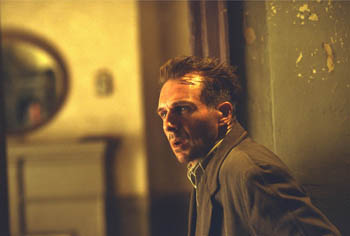![[Metroactive Movies]](/movies/gifs/movies468.gif)
[ Movies Index | Show Times | Silicon Valley | Metroactive Home | Archives ]

Eight-Legged Freak Out: Ralph Fiennes bugs out in 'Spider.' Webmaster Director David Cronenberg turns the screw in perfect horror movie 'Spider' WHEN DENNIS Cleg enters the scene in Spider, he is the last man out of a train that has pulled into a glass-roofed railway station. With his frowsy hair, his fingers tanned with nicotine and his dirty raincoat, Cleg resembles all of the inaudibly mumbling bums you speed up to pass by on the sidewalk. He stands, going through every paranoid schizophrenic ritual of checking, rechecking, re-rechecking, before going his halting way into the grayest part of London in the 1980s. "There are some men ..." wrote the author of mystery and imagination tales E.T.A Hoffmann, "whom Nature or a strange destiny has deprived of the covering behind which most of us hide our madness from ourselves, and the rest of the world." Called Spider in his childhood, Cleg (Ralph Fiennes) is all but nameless now--just sane enough to find his halfway house. This boarding house sits on an empty street near the railway and the gasworks. The only patient there well enough to speak is a palsied gent named Terrence (John Neville, "the well-manicured man" from The X-Files). Without knowing it, this kindly old man plants bitter, taunting clues in Spider's ears. The woman who runs the house is a mean warden (Lynn Redgrave). She enjoys intruding. She loves being able to treat grown men as if they were 6-year-olds, drawing their rusty bath water, the color of weak tea, and chiding them as they eat their bowls of gruel in the morning. All this is bad enough. Then the film's director--the one and only David Cronenberg--and its writer, Patrick McGrath, turn the screw. Spider's new home is in the neighborhood where he grew up, and where he lost his mind. In the solitude his room ("He can hear the wallpaper bubbling," Cronenberg says in the production notes), Spider is tormented by the emissions from the 10-story gasworks directly across the street. Nothing will drive you nuts faster than the smell of gas. Through all these distractions and terrors, Spider investigates the crime that sent him to the institutions where he spent most of his life. He writes his findings in a crabbed, coded script in a small notebook he hides from the world. Through the windows he spies out of and on the night streets he walks down, Spider can see his childhood staged for him, as if it were a play. He sees himself as he was when he was 10 (Bradley Hall plays the young Spider). As a boy, he was subjected to the wrath of his ill-tempered father, Bill (Gabriel Byrne), and cosseted by his loving but delicate mother (Miranda Richardson, never better). There's a fourth party: the whoriest whore in the world (also played by Richardson), who latches onto Bill at the pub. Her teeth are so bad that it looks as if they've been filed, cannibal-style. In a tunnel, she couples with Spider's father, makes lewd, snarling faces to urge him on to orgasm, and the erotic and the horrible blend as they only blend in Cronenberg movies. And in the shadows, the adult Spider trembles, observing this childhood scene of primal betrayal. I thought Fiennes was sensational as the Blake-drunk madman Dolarhyde in Red Dragon; he had finally learned to act for the camera in a way he hadn't in his brief heyday, post-The English Patient. As the creeping, scuttling Spider, Fiennes acts almost completely in pantomime, using only inaudible utterances. Yet he gives the part the essential well-bredness that makes horror poignant. As in Anthony Perkins' Norman Bates, there's something in Spider that's trying so hard to be a good boy. Cronenberg builds Spider's world influenced by Roger Mayne's London street photography of the late 1950s. The film is nostalgic for the brown bricks and pubs, and the houses with the loos in the backyard, and puddings made of guts and blood, and sex standing up under a railway viaduct, and allotment gardens and canal paths. Spider looks like what would happen if Distant Voices, Still Lives' Terence Davies made a horror film. In a fit of inspiration, Cronenberg brings something macabre to these familiar images of the old black-pudding- and eel-pie-eating London. It takes a while to realize that Spider's unease is due to the fact that there is no one alive on these London streets. Having pretty much made the best movie about cancer (1986's The Fly), Cronenberg follows with one of the best movies ever about schizophrenia. The most effective and moving horror films feature recognizably human monsters--like Brundlefly, like Spider/Cleg. On another level, the film is also a work of protest against the dumping of mad people on the streets, to the degradation not just of themselves but of everyone who steps over them ignoring their pleas for help.
Spider (R; 98 min.), directed by David Cronenberg, written by Patrick McGrath, based on his novel, photographed by Peter Suschitzky and starring Ralph Fiennes, Gabriel Byrne and Miranda Richardson, opens Friday at the Towne Theater in San Jose.
Send a letter to the editor about this story to letters@metronews.com. [ Silicon Valley | Metroactive Home | Archives ]
|
From the March 6-12, 2003 issue of Metro, Silicon Valley's Weekly Newspaper.
Copyright © Metro Publishing Inc. Metroactive is affiliated with the Boulevards Network.
For more information about the San Jose/Silicon Valley area, visit sanjose.com.